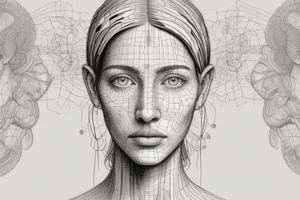Podcast
Questions and Answers
What is the focus of social psychology?
What is the focus of social psychology?
- The biological basis of behavior among groups
- The individual traits that differentiate one person from another
- The ways in which individuals perceive and influence one another (correct)
- The interactions between individuals and their environment
Which best describes the concept of self-esteem?
Which best describes the concept of self-esteem?
- The ability to present oneself favorably in social situations
- A fixed measure of one's abilities and skills
- An individual's overall subjective evaluation of their worth (correct)
- The beliefs one has about their future potential
What is meant by the term 'self-presentation'?
What is meant by the term 'self-presentation'?
- The process of controlling how others perceive oneself (correct)
- The internal motivation to elevate one's self-worth
- How individuals behave in accordance with their self-concept
- An innate ability to reflect on personal experiences
What method does the Covariation Model utilize to determine attribution?
What method does the Covariation Model utilize to determine attribution?
How does cultural psychology differ from social psychology?
How does cultural psychology differ from social psychology?
In the context of self-concept, what is introspection?
In the context of self-concept, what is introspection?
What do 'thin slices' refer to in person perception?
What do 'thin slices' refer to in person perception?
What is the main focus of attribution theories?
What is the main focus of attribution theories?
What aspect of self-concept involves understanding oneself through self-reflection?
What aspect of self-concept involves understanding oneself through self-reflection?
How is self-esteem primarily developed according to social psychological principles?
How is self-esteem primarily developed according to social psychological principles?
What is a common misconception about how people perceive situations in social psychology?
What is a common misconception about how people perceive situations in social psychology?
What role does non-verbal behavior play in person perception?
What role does non-verbal behavior play in person perception?
What does the Covariation Model suggest about attribution processes?
What does the Covariation Model suggest about attribution processes?
What issue is commonly associated with thin slices in social perception?
What issue is commonly associated with thin slices in social perception?
In what way does attribution theory help to explain human behavior?
In what way does attribution theory help to explain human behavior?
What does self-monitoring refer to in social psychology?
What does self-monitoring refer to in social psychology?
Which of the following best describes self-verification?
Which of the following best describes self-verification?
How do cultural influences affect self-concept?
How do cultural influences affect self-concept?
Study Notes
Social Psychology
- Humans are inherently social beings, influencing each other's thoughts, feelings, and behaviors.
- Social psychology examines how individual behavior is affected by social context and interactions.
Cultural Psychology
- Focuses on how culture influences psychological processes.
- Emphasizes understanding psychological phenomena within cultural contexts.
Research Methods
- Varied methodologies are applied to gather data in social psychology, ranging from experimental to observational techniques.
- Quantitative and qualitative methods are both essential in capturing diverse psychological nuances.
Self-Concept
- Self-concept is an individual's perception of themselves based on personal beliefs and feelings.
- Continually shaped by interactions with others and the environment.
Origins of Self-Concept: Introspection & Forecasting
- Introspection: Self-reflection helps individuals assess their thoughts and motivations.
- Forecasting: Predicting one's future feelings and behavior contributes to the formation of self-concept.
Culture and Self-Concept
- Culture plays a vital role in shaping self-identity and conceptions of self-worth.
- Differences exist between individualistic and collectivistic cultures in the understanding of self.
Where Does Self-Concept Come From
- Factors influencing self-concept include social interactions, feedback from others, and life experiences.
- Media and cultural narratives also significantly impact self-perception.
Self-Esteem
- Refers to an individual’s overall subjective evaluation of their own worth.
- Influenced by achieved goals, societal standards, and personal expectations.
Self-Presentation
- Involves the strategic manner in which individuals portray themselves to influence how others perceive them.
- Techniques include impression management to align perceptions with desired identities.
Self-Verification
- The process by which individuals seek confirmation of their self-concept from others.
- Influences relationships and interactions, often leading to selective social circles.
Self-Monitoring
- A personality trait reflecting the degree to which individuals adjust their behavior in social situations.
- High self-monitors assess social cues closely, adapting their actions, while low self-monitors prioritize personal beliefs.
Person Perception
- The study of how we form impressions of and make judgments about others.
Thin Slices & Physical Appearance
- Thin slices refer to brief snippets of observation that influence judgments about others.
- Physical appearance strongly affects first impressions and perceived credibility.
Perceiving Situations
- Individuals interpret social situations based on context and prior experiences.
- Misinterpretations can lead to erroneous conclusions about others’ behaviors.
Mind Perception
- The ability to perceive the mental states of others influences social interactions.
- Factors include empathy and social cues.
Non-Verbal Behavior
- Includes facial expressions, gestures, and body language, which communicate emotions and intentions.
- Vital for understanding social dynamics beyond spoken communication.
Deception Detection
- The process of recognizing when someone is being dishonest, often relying on nonverbal cues.
- Accuracy varies, with many factors influencing the ability to detect deceit.
Attribution Theories
- Explore how people attribute causes to behavior, distinguishing between internal and external factors.
- Highlights biases such as fundamental attribution error, where personal qualities are overvalued over situational influences.
Covariation Model
- Suggests that people make attributions by assessing consistency, distinctiveness, and consensus in behavior.
- Helps in understanding judgment-making in social contexts.
Jones & Harris (1967)
- A pivotal study demonstrating how attitudes are inferred based on behavioral cues despite contrary feedback.
- Highlights the influence of situational pressures on perceived motivations.
Attribution Errors
- Common pitfalls include the fundamental attribution error and self-serving bias.
- These errors can lead to misinterpretation of others' actions and reinforce pre-existing beliefs.
Social Psychology
- Humans are inherently social beings, influencing each other's thoughts, feelings, and behaviors.
- Social psychology examines how individual behavior is affected by social context and interactions.
Cultural Psychology
- Focuses on how culture influences psychological processes.
- Emphasizes understanding psychological phenomena within cultural contexts.
Research Methods
- Varied methodologies are applied to gather data in social psychology, ranging from experimental to observational techniques.
- Quantitative and qualitative methods are both essential in capturing diverse psychological nuances.
Self-Concept
- Self-concept is an individual's perception of themselves based on personal beliefs and feelings.
- Continually shaped by interactions with others and the environment.
Origins of Self-Concept: Introspection & Forecasting
- Introspection: Self-reflection helps individuals assess their thoughts and motivations.
- Forecasting: Predicting one's future feelings and behavior contributes to the formation of self-concept.
Culture and Self-Concept
- Culture plays a vital role in shaping self-identity and conceptions of self-worth.
- Differences exist between individualistic and collectivistic cultures in the understanding of self.
Where Does Self-Concept Come From
- Factors influencing self-concept include social interactions, feedback from others, and life experiences.
- Media and cultural narratives also significantly impact self-perception.
Self-Esteem
- Refers to an individual’s overall subjective evaluation of their own worth.
- Influenced by achieved goals, societal standards, and personal expectations.
Self-Presentation
- Involves the strategic manner in which individuals portray themselves to influence how others perceive them.
- Techniques include impression management to align perceptions with desired identities.
Self-Verification
- The process by which individuals seek confirmation of their self-concept from others.
- Influences relationships and interactions, often leading to selective social circles.
Self-Monitoring
- A personality trait reflecting the degree to which individuals adjust their behavior in social situations.
- High self-monitors assess social cues closely, adapting their actions, while low self-monitors prioritize personal beliefs.
Person Perception
- The study of how we form impressions of and make judgments about others.
Thin Slices & Physical Appearance
- Thin slices refer to brief snippets of observation that influence judgments about others.
- Physical appearance strongly affects first impressions and perceived credibility.
Perceiving Situations
- Individuals interpret social situations based on context and prior experiences.
- Misinterpretations can lead to erroneous conclusions about others’ behaviors.
Mind Perception
- The ability to perceive the mental states of others influences social interactions.
- Factors include empathy and social cues.
Non-Verbal Behavior
- Includes facial expressions, gestures, and body language, which communicate emotions and intentions.
- Vital for understanding social dynamics beyond spoken communication.
Deception Detection
- The process of recognizing when someone is being dishonest, often relying on nonverbal cues.
- Accuracy varies, with many factors influencing the ability to detect deceit.
Attribution Theories
- Explore how people attribute causes to behavior, distinguishing between internal and external factors.
- Highlights biases such as fundamental attribution error, where personal qualities are overvalued over situational influences.
Covariation Model
- Suggests that people make attributions by assessing consistency, distinctiveness, and consensus in behavior.
- Helps in understanding judgment-making in social contexts.
Jones & Harris (1967)
- A pivotal study demonstrating how attitudes are inferred based on behavioral cues despite contrary feedback.
- Highlights the influence of situational pressures on perceived motivations.
Attribution Errors
- Common pitfalls include the fundamental attribution error and self-serving bias.
- These errors can lead to misinterpretation of others' actions and reinforce pre-existing beliefs.
Studying That Suits You
Use AI to generate personalized quizzes and flashcards to suit your learning preferences.
Related Documents
Description
Explore the fundamentals of social psychology in this introductory lecture. Discover what social psychology is, the concept of common sense versus scientific understanding, and an overview of cultural psychology and research methods. This quiz will help reinforce your understanding of key topics in social psychology.




